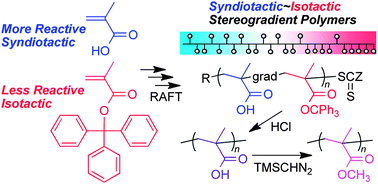Stereogradient polymers are a new class of polymers in which the tacticity continuously changes from one chain end to the other. Such polymers may exhibit special properties or functions that originate from gradual changes in the physical or chemical properties along the polymer backbone. In this article, the synthesis of stereogradient polymers with tacticities that vary from predominantly syndiotactic to highly isotactic was investigated by reversible addition–fragmentation chain transfer (RAFT) copolymerization of bulky methacrylates, such as triphenylmethyl methacrylate (TrMA) and 1-phenyldibezosuberyl methacrylate (PDBSMA) and methacrylic acid (MAA) in both non-polar and polar solvents. With the differing reactivities and stereospecificities or TrMA and MAA, the isotacticity of the resulting copolymer gradually increased from 11% to nearly 100% along the polymer chain. Interestingly, the reported method can be applied to the synthesis of various stereogradient poly(MAA)s or polymethacrylates by postpolymerization modification.
From-syndiotactic-to-isotactic stereogradient methacrylic polymers by RAFT copolymerization of methacrylic acid and its bulky esters by Kenji Ishitake , Kotaro Satoh , Masami Kamigaito and Yoshio Okamoto, Polym. Chem., 2012, 3, 1750-1757.
To keep up-to-date with all the latest research, sign up for the journal’s e-alerts or RSS feeds or follow Polymer Chemistryon Twitter or Facebook.











